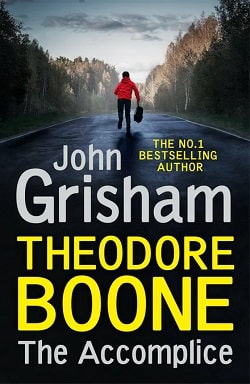In The Accomplice, the seventh installment of John Grisham's beloved Theodore Boone series, readers are once again drawn into the world of juvenile justice through the eyes of a precocious young protagonist. Grisham, known for his gripping legal thrillers, shifts his focus to a more youthful audience while maintaining the tension and moral complexity that characterize his work. This novel tackles themes of friendship, responsibility, and the often harsh realities of the legal system, making it a compelling read for both young adults and adults alike.
The story revolves around Woody Lambert, a troubled teenager from a broken family. Woody's struggles are palpable; he grapples with poor grades and the burden of having an older brother, Tony, who is on probation for a drug offense. This backdrop sets the stage for a narrative that explores the consequences of choices made by young people, often in the heat of the moment. When Woody finds himself in a precarious situation with Tony and their friend Garth, a seemingly innocent joyride quickly spirals into a life-altering event. Garth's reckless decision to hold up a convenience store with a fake gun leads to Woody's arrest as an accomplice, despite his lack of involvement in the crime itself.
Grisham's portrayal of Woody is both sympathetic and realistic. The author skillfully captures the confusion and fear that accompany adolescence, particularly when faced with the weight of legal repercussions. Woody's character development is central to the narrative; he evolves from a passive participant in his circumstances to someone who must confront the harsh realities of his situation. This transformation is not only compelling but also serves as a reminder of the importance of making wise choices, especially in a world where the consequences can be dire.
Enter Theodore Boone, the series' titular character, who is not only Woody's friend but also an aspiring lawyer. At just thirteen years old, Theo embodies the spirit of youthful determination and idealism. He is portrayed as a beacon of hope for Woody, as he navigates the complexities of the legal system with a mix of naivety and burgeoning expertise. Grisham effectively uses Theo's character to illustrate the power of friendship and loyalty, as he steps up to help Woody in his time of need. The dynamic between the two boys adds depth to the narrative, showcasing how support systems can be crucial in overcoming life's challenges.
The legal intricacies that Grisham weaves into the story are both educational and engaging. Readers are given a glimpse into the juvenile justice system, highlighting its flaws and the often disproportionate consequences faced by young offenders. Grisham's ability to simplify complex legal concepts makes the story accessible to younger readers while still providing enough depth to engage adult audiences. The tension builds as Theo works tirelessly to devise a strategy to help Woody avoid juvenile prison, showcasing Grisham's knack for creating suspenseful courtroom drama.
One of the most striking themes in The Accomplice is the idea of accountability. Woody's predicament serves as a cautionary tale about the importance of being mindful of the company one keeps. Grisham does not shy away from illustrating the ripple effects of poor decisions, particularly in the lives of young people who may not fully understand the consequences of their actions. This theme resonates deeply in today's society, where peer pressure and the desire for acceptance can lead to dangerous situations.
Moreover, the novel touches on the concept of redemption. As Woody grapples with his circumstances, he is given the opportunity to reflect on his choices and the path he wishes to take moving forward. This introspection is a vital aspect of his character arc, allowing readers to witness his growth and the potential for change. Grisham's exploration of redemption is not only relevant to Woody's journey but also serves as a broader commentary on the capacity for growth and transformation in all individuals, regardless of their past mistakes.
In terms of pacing, The Accomplice maintains a brisk tempo that keeps readers engaged from start to finish. Grisham's writing style is straightforward yet impactful, allowing the story to unfold naturally without unnecessary embellishments. The dialogue is authentic, capturing the voices of teenagers and the nuances of their interactions. This authenticity adds to the overall realism of the narrative, making it relatable for young readers who may find themselves in similar situations.
Comparatively, Grisham's work in this series can be likened to other young adult novels that explore legal themes, such as Monster by Walter Dean Myers or The Hate U Give by Angie Thomas. Both of these works delve into the complexities of justice and the societal factors that influence young people's lives. However, Grisham's unique approach, rooted in his extensive knowledge of the legal field, sets The Accomplice apart, providing a more nuanced understanding of the legal system through the lens of youth.
Overall, The Accomplice is a thought-provoking addition to the Theodore Boone series that successfully balances entertainment with important life lessons. Grisham's ability to craft relatable characters and weave intricate legal dilemmas into a coming-of-age story makes this novel a must-read for young adults and anyone interested in the intersection of youth and justice. The book not only entertains but also encourages readers to reflect on their choices and the impact they can have on their lives and the lives of others.
In conclusion, John Grisham's The Accomplice is a powerful exploration of friendship, accountability, and the quest for redemption. It serves as a reminder that even in the face of adversity, there is always a path to understanding and growth. This novel is sure to resonate with readers, leaving them with a sense of hope and the understanding that one's past does not have to dictate their future.
























Reviews 0
Post a Reviews: